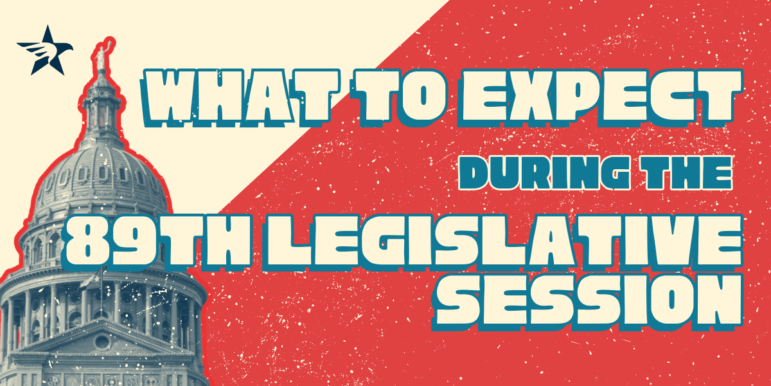Despite the 88th Session ending only what feels like two seconds ago, a new round of the Texas Legislature is upon us. The 89th Texas Legislative Session will officially begin at noon on January 14, 2025, and run until sine die on June 2, 2025. TFN’s Political Team has been hard at work for months preparing for this week—here’s a glimpse into our magical world ✨(and, of course, how you can get involved)!
Texas House Speaker Race
The Texas Legislature is always full of surprises, but the 89th Session is even more unpredictable thanks to a no-incumbent speaker’s race.
The Speaker of the Texas House, much like in the U.S. Congress, is elected each session to lead the chamber: assigning committees, liaising with the governor and lieutenant governor, setting chamber priorities, and more. Following pressure from even-farther-right Republicans Gov. Greg Abbott and Attorney General Ken Paxton, previous House Speaker (and relative moderate) Dade Phelan backed out of seeking reelection.
Republicans are currently largely divided between two candidates: Dustin Burrows and David Cook. Rep. Cook received the House Republican Caucus’s endorsement (note: after a vote in which neither hit the necessary threshold to receive an endorsement, many of Rep. Burrows’s supporters walked out) and Burrows received support from more moderate Republicans and several Democrats.
Speakers are elected with a simple majority—76 votes. There are 88 Republicans in the House, but if they remain heavily divided on their choice, a speaker candidate will need Democratic support to win. Democrats have not collectively backed any candidate, but the House Democratic Caucus did formally anti-endorse Cook. With no candidate having a clear majority, potential behind-the-scenes discussions and compromises could be deciding factors in the race, not to mention, powerfully shape the upcoming session.
So… How Do We Know What’s Coming?
Here’s the thing: Technically, we don’t. BUT, even with all this unpredictability, there are a few insider tricks we can share with you to help you understand what type of bills are more likely to advance through the legislative process.
Tip 1: What’s the Bill Number?
Every bill is assigned a number, such as HB ## or SB ####. For the most part, bill numbers just indicate when they were filed, with lower-numbered bills filed earlier and higher-numbered bills filed later. There are exceptions, though.
HB 1 and SB 1 will typically be each chamber’s proposal for the state’s budget, even though so far this year, neither has been filed yet.
HB 2-150*, SB 2-40, and even some hundreds like HB 300 are also set aside; these will be assigned to bills each chamber’s leadership determines are priority bills (with, historically, a portion allocated for any minority party’s priority bills). When someone refers to “the first 150/40 bills,” they are referring to these specially numbered bills, not the first bills chronologically filed.
Fun legislative fact: HB 666 has been set aside—presumably so that nobody files it 😇—but SB 666 has been filed! 😈
*The particularly lege-savvy reader may recall this number as the first 100 bills in the House. You are correct; this is a fun new change for the 89th Session.
Tip 2: Who filed it?
Every member of the legislature has a different level of influence on the legislative process. Members who hold leadership positions such as committee chair, have been in office for multiple sessions, and/or have historically passed a larger portion of their bills are often more likely to see their bills advance. Less visible to the general public is the possible sway that personal relationships can have. For example, a member’s committee mates, friends, mentors, deskmates, and even roommates* may have a level of importance.
*Fun legislative fact #2: some members who don’t live in Austin year-round will choose to live together during session.
Tip 3: Has someone in leadership listed it as a priority?
Some bills are specifically mentioned by Gov. Abbott, a party’s leadership, or a chamber’s leadership as a priority to pass, and this increased pressure and public attention can accelerate a bill’s progress. Here’s a good example of the kind of pressure legislators can get from higher up: 15 incumbent Republicans lost their primaries after they rejected voucher schemes in 2023, leading Gov. Abbott to publicly endorse and fund their challengers. Vouchers are currently being touted by the governor as the number one priority for the 89th Session, and while it’s unlikely that every bill creating a voucher program will advance, it is likely that a select few will.
If a particular bill hasn’t been listed as a priority but is relevant to a priority issue, it also might be more likely to pass.
Another thing we know for sure about 89th Texas Legislative Session is that thousands of bills have already been filed, which leads us to…
Lemme See Some Bills!
Here are some of the bills we are already monitoring for the 2025 Legislative Session:
- HB 1009 and HB 1348
- HB 1009 (Mike Olcott) and HB 1348 (Mitch Little) are this session’s Ten Commandments bills. They would require the Ten Commandments to be displayed in every public school classroom—yet another blatant attempt by the religious right to turn our public schools into Sunday schools.
- HB 955 and HB 1197
- HB 955 (Steve Toth) and HB 1197 (Pat Curry) would require school board candidates to run as members of a political party, further politicizing the education of children in our neighborhood public schools.
- HB 1390
- HB 1390, filed by Erin Zweiner, would require school districts to notify parents if religious curriculums, such as the Bible-infused Bluebonnet curriculum, are being taught in their children’s classrooms. This is especially critical given that our report found that Bluebonnet’s provided notifications do not adequately warn parents of the full extent of religious bias in the curriculum.
How to Get Involved
Sign up for our legislative updates so you never miss the opportunity to make your voice heard during the 89th Texas Legislative Session. We’ll update you with when key bills pick up traction, share ways to contact your representatives from home, and notify you of when we could use your support at the Capitol. Get ready to take action by reviewing our resources on how to drop a card and testify at a hearing, and check out this explainer on how bills become law.
It’s going to be a long, busy few months. At times, it will be overwhelming, scary, heartbreaking, and infuriating. But it will also be empowering, inspiring, joyful, and meaningful. We will come together as we always have. We will create spaces of solidarity, hope, and support. We will center and celebrate the beauty and power of immigrant Texans, queer Texans, transgender Texans, Texans of color, young Texans, Texans of faith, and Texans of all abilities.
We will never be alone. We will never leave someone behind. And we will never give up. Join us.



